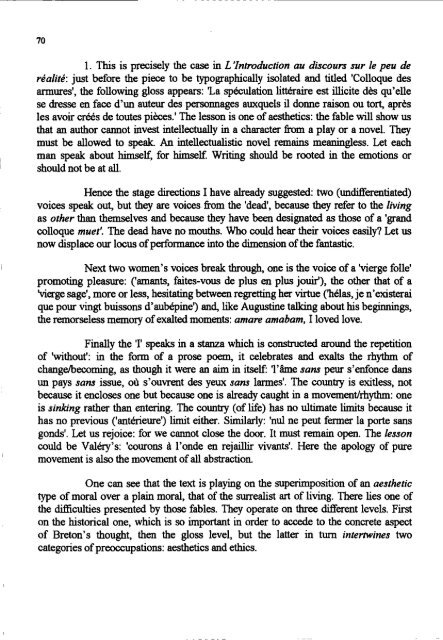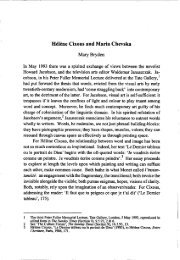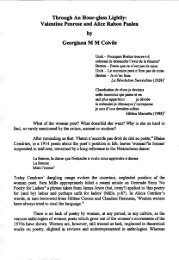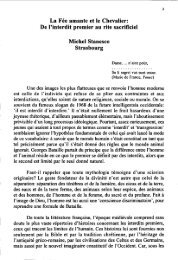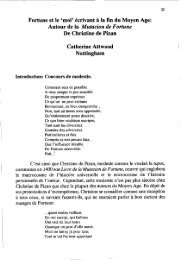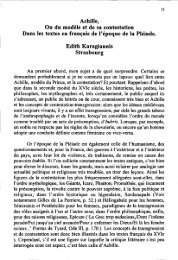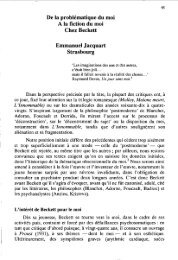The Poetics of Bricolage: André Breton's Theoretical Fables by ...
The Poetics of Bricolage: André Breton's Theoretical Fables by ...
The Poetics of Bricolage: André Breton's Theoretical Fables by ...
You also want an ePaper? Increase the reach of your titles
YUMPU automatically turns print PDFs into web optimized ePapers that Google loves.
70<br />
1. This is precisely the case in L 'Introduction au discours sur le peu de<br />
réalité: just before the piece to be typographically isolated and titled 'Colloque des<br />
armures', the following gloss appears: Za spéculation littéraire est iiiicite dès qu'elle<br />
se dresse en face d'un auteur des personnages auxquels il donne raison ou tort, après<br />
les avoir créés de toutes p ih.' <strong>The</strong> lesson is one <strong>of</strong> aesîhetics: the fable will show us<br />
that an author cannot invest intellectually in a character from a play or a novel. <strong>The</strong>y<br />
must be allowed to speak. An intellectualistic novel remains meaningless. Let each<br />
man speak about himself, for himself. Writing should be rooted in the emotions or<br />
should not be at all.<br />
Hence the stage directions I have already suggested: two (unmerentiated)<br />
voices speak out, but they are voices from the 'dead', because they refer to the living<br />
as other than themselves and because they have been designated as those <strong>of</strong> a 'grand<br />
colloque muet'. <strong>The</strong> dead have no mouths. Who could hear their voices easily? Let us<br />
now displace our locus <strong>of</strong> performance into the dimension <strong>of</strong> the fantastic.<br />
Next two women's voices break through, one is the voice <strong>of</strong> a 'vierge folle'<br />
promoting pleasure: ('amants, faites-vous de plus en plus jouir'), the other that <strong>of</strong> a<br />
'vierge sage', more or less, hesitating bemeen regretting her virtue ('hélas, je n'existerai<br />
que pour vingt buissons d'aubépine') and, like Augustuie talking about his beginnings,<br />
the remorseless memory <strong>of</strong> exalted moments: amare amabam, I loved love.<br />
Finally the 'I' speaks in a stanza which is constructed around the repetition<br />
<strong>of</strong> 'without': in the form <strong>of</strong> a prose poem, it celebrates and exalts the rhythm <strong>of</strong><br />
change/bmming, as though it were an aim in itself: 'l'âme sans peur s'enfonce dans<br />
un pays sans issue, où s'ouvrent des yeux sans larmes'. <strong>The</strong> country is exitless, not<br />
because it encloses one but because one is already caught in a movementhhythm: one<br />
is sinking rather than entering. <strong>The</strong> country (<strong>of</strong> life) has no ultimate limits because it<br />
has no previous ('antérieure') limit either. Similarly: 'nul ne peut fermer la porte sans<br />
gonds'. Let us rejoice: for we cannot close the door. It must remain open. <strong>The</strong> lesson<br />
could be Valéry's: 'courons à l'onde en rejaillir vivants'. Here the apology <strong>of</strong> pure<br />
movement is also the movement <strong>of</strong> all abstraction.<br />
One can see that the text is playing on the supenmposition <strong>of</strong> an aesthetic<br />
type <strong>of</strong> moral over a plain moral, that <strong>of</strong> the surrealist art <strong>of</strong> living. <strong>The</strong>re lies one <strong>of</strong><br />
the difficulties presented <strong>by</strong> those fables. <strong>The</strong>y operate on three Werent levels. First<br />
on the historical one, which is so important in order to accede to the concrete aspect<br />
<strong>of</strong> <strong>Breton's</strong> thought, then the gloss level, but the latter in turn intertwines two<br />
categories <strong>of</strong> preoccupations: aesthetics and ethics.


